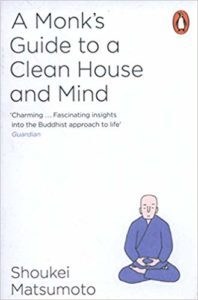In Zen philosophy, an individual cannot advance along the paths of enlightenment if internally it is not in order, both in mind and in spirit. But more than an end in itself, the order is an infinite and intermittent process that always coexists with chaos. And that must be sought since it never comes alone. 
That is, we must order if we want to order, right? The same happens in our house or any living space, which we must sort and clean every so often. Thus, an ordered space is the perfect metaphor to understand the mental and spiritual order that Zen philosophy speaks about, but it can be more than a metaphor and become the ideal practice to dispel all internal chaos in us on a daily basis.
That is what the Zen monk Shoukei Matsumoto proposes in his book “A Monk’s Guide to a Clean House and Mind”, which is already a best-seller in Japan. For this peculiar monk, ordering the house or any other living space in a conscious and relaxed way, removing the dust as if we were removing it from our own spirit, is a path to enlightenment:
We will sweep the dust to remove our earthly desires. We scrub dirt to free ourselves from our bonds. We live simply and take time to contemplate the self.

It is an activity that in Buddhist temples is known as Soji: the moment in the morning where, just up and before meditating or praying, the monks perform some specific cleaning task for 20 minutes. Something that, according to Matsumoto, we should all do because also has the power to gather collectivities, as well as to quiet solitaries. The important thing is that we do it, by abstracting from anything else outside the action we are doing; we just take advantage of the mindfulness moment implied by each cleaning task to contemplate and meditate.
Matsumoto does this with other monks every 2 weeks at the Komyoji Temple in Kyoto, as a way of living together and ordering that which tends to chaos in a natural way. For Matsumoto, this simple practice is ideal, since it is also something that we have to do every now and then. The question is what kind of energy we imprint on the inevitable task of cleaning, to transform it from an annoying task in a moment of introspective reflection.
Interestingly, the benefits of ordering the home have also been proven by science: people who enjoy ordering their homes are more relaxed and suffer less stress, according to some research. And undoubtedly, cleaning the home -even, reserving for it 1 day a week- considerably improves the lives of those who live on their own, and makes them more disciplined. So there are only benefits if we make the habit of ordering the home.
Anyway, this reminds us why Zen philosophy and practice is so charming. In it, there are no dualisms: the mind is the house and the house is the mind. And as master Taisen Deshimaru said: “the spiritual is material and the material becomes spiritual”.
So the next time you have to sweep, think about this and make the most of an action that can be both routine and annoying, as well as enlightening and enriching.

